Turkish Crypto Conversion Cost Calculator
Conversion Input
Conversion Results
When you live in Turkey and your savings lose value every month, it’s no surprise people turn to cryptocurrency. The Turkish lira has been sliding for years, and crypto offers a way out - or at least a temporary shield. But here’s the catch: you can trade Bitcoin, Ethereum, and other coins all you want, but you can’t use them to pay for coffee, rent, or groceries. That’s the reality of Turkey’s crypto rules in 2025.
Trading Is Legal. Payments Are Not.
Since April 2021, Turkey has drawn a hard line: you can buy, sell, and hold cryptocurrency. But you can’t use it to pay for goods or services. The Central Bank of Turkey (TCMB) made this clear to prevent capital flight and protect the lira’s stability. This isn’t a ban on crypto - it’s a ban on its use as money. You can own it, but you can’t spend it. That’s a weird middle ground, and it’s created a whole underground economy.
People still trade. In fact, Turkey ranks 11th in the world for crypto adoption. Exchanges like BTCTurk and Paribu are packed with users. But here’s the problem: if you buy Bitcoin to protect your savings, you need to turn it back into lira to live. And that means selling on an exchange, waiting for the transfer, and hoping the rate hasn’t dropped. It’s slow. It’s messy. And now, it’s getting stricter.
The New Rules Coming in February 2025
Starting February 2025, Turkey is rolling out its most aggressive crypto regulations yet. All crypto service providers - exchanges, wallets, custodians - must now be licensed by the Turkish Capital Markets Board (CMB). That’s not a suggestion. It’s the law. And the bar is high.
Exchanges need at least 150 million Turkish lira ($4.1 million) in capital. Custodians? Half a billion lira ($13.7 million). Compare that to the EU, where licensing thresholds are often ten times lower. These aren’t just paperwork requirements - they’re financial walls. Smaller platforms can’t afford them. Many will shut down. The market will shrink, and only the biggest players will survive.
On top of that, every user must go through strict identity checks. If you’re moving more than 15,000 Turkish lira ($425) in crypto, you need to prove who you are. Unregistered wallets? They’ll be flagged. And if you’re caught using a friend’s account to move money? That’s now a red flag for money laundering.
MASAK Can Freeze Your Crypto Account
The biggest change coming isn’t about licenses or capital. It’s about power. The Financial Crimes Investigation Board (MASAK) is about to get the legal right to freeze crypto accounts - no court order needed. That’s huge.
Imagine this: you’re just trading Bitcoin. You’ve done nothing illegal. But if MASAK sees a pattern - a sudden deposit from a known scam wallet, or repeated transfers to a flagged address - they can lock your account. No warning. No appeal. Just a freeze. This is meant to stop criminals who rent accounts to launder money. But it’s also a risk for ordinary users.
This move is tied to global standards from the Financial Action Task Force (FATF). Turkey wants to look serious about anti-money laundering. But the lack of transparency in how MASAK makes these decisions leaves traders nervous. Who decides what’s suspicious? What’s the appeal process? No one knows yet.

Why This Is Different From the EU or the US
Most countries are trying to make crypto part of the financial system. The EU’s MiCA rules let regulated crypto payments happen. The U.S. has a patchwork of state laws, but no outright ban on spending crypto. Turkey is going the opposite way.
They’re copying the EU’s compliance standards - KYC, AML, audits - but rejecting the core idea that crypto can be money. It’s like saying, “You can own a car, but you can’t drive it on public roads.” The result? A thriving grey market. People use peer-to-peer platforms, Telegram groups, and cash trades to convert crypto to lira. It’s risky, but it’s the only way around the system.
And while the U.S. and EU focus on consumer protection and innovation, Turkey’s priority is control. They’re not trying to build a crypto economy. They’re trying to contain it.
What This Means for Everyday Users
If you’re a Turkish citizen trading crypto, here’s what you’re dealing with:
- You can’t pay bills with Bitcoin, even if you want to.
- You must verify your identity for any large transaction.
- You’re stuck with licensed exchanges - no decentralized platforms like PancakeSwap are allowed anymore.
- Your account can be frozen at any time by MASAK without notice.
- You’re paying high fees to convert crypto to lira, and you’re doing it often.
Some people say this is good - it stops fraud. Others say it’s a trap. The lira is unstable, and crypto was supposed to be a way out. Now, the government is making it harder to use that escape hatch.
And here’s something no one talks about much: crypto profits are still not taxed in Turkey. That’s a big reason people keep trading. But that could change. The Finance Ministry is already looking at ways to tax crypto gains. If they do, it could send a shock through the market.

The Bigger Picture: Crypto as a Hedge Against the Lira
The real story behind Turkey’s crypto restrictions isn’t about regulation. It’s about desperation.
The Turkish lira lost over 40% of its value against the dollar in the last two years. Inflation hit 85% in 2023. People aren’t trading crypto because they believe in blockchain. They’re trading because they’re scared their savings will vanish overnight.
Every time the lira drops, crypto trading spikes. Every time the government tightens rules, people find new ways around them. The regulations aren’t stopping adoption - they’re just forcing it underground.
What Turkey has created is a paradox: the most restrictive crypto environment in the world, built around the most active crypto users. The government wants to protect the lira. But the people are using crypto to protect themselves from the lira.
What’s Next?
The February 2025 rules are just the beginning. The government is already drafting new rules for stablecoins - limiting how much you can transfer and requiring detailed reports on where the money came from. They’re also cracking down on “rented accounts,” where criminals pay locals to use their IDs to move money.
For traders, the message is clear: if you want to play in Turkey’s crypto market, you need to be compliant. That means using licensed exchanges, keeping records, and avoiding any activity that looks even slightly suspicious. And if you’re thinking of starting a crypto business? Forget it unless you’ve got millions in capital and a legal team on standby.
For everyone else? You’ll keep trading. You’ll keep converting. You’ll keep finding ways to protect your money. Because when your currency is falling and your options are limited, crypto isn’t a trend. It’s survival.




Veeramani maran
November 4, 2025 AT 11:25bro the lira is just a paper napkin at this point 😅 i bought 0.1 btc last year for 2.5M lira now its 8M and i still cant buy a damn kebab with it
Kevin Mann
November 5, 2025 AT 01:52OH MY GOD. I JUST REALIZED THIS IS LIKE A DYSTOPIAN VIDEO GAME WHERE YOU CAN OWN THE WEAPON BUT NOT USE IT?? 🤯 like imagine having a Ferrari but the government says you can only park it in your garage and look at it?? I’m not even Turkish and I’m having an existential crisis. WHY DO THEY DO THIS TO THEIR PEOPLE?? 😭
Kathy Ruff
November 6, 2025 AT 06:56The regulatory approach is actually not unique-many emerging economies struggle with balancing financial stability and innovation. Turkey’s case is extreme because of hyperinflation, but the intent-to prevent capital flight-is understandable. The problem is the execution: freezing accounts without due process undermines trust. What’s needed is transparency, not just control.
Robin Hilton
November 7, 2025 AT 11:59Let me get this straight. You’re telling me Americans have it easy with crypto? We can spend it at Starbucks. Meanwhile, Turks are risking jail just to buy groceries? This is why I hate when people say ‘free markets’-this is state-controlled chaos. And don’t even get me started on how the EU is pretending to be progressive while doing the same thing under a different name.
Grace Huegel
November 7, 2025 AT 16:49It’s tragic. People are forced into this digital underground because their own government has failed them. I feel so sorry for them. The emotional weight of watching your savings evaporate... it’s not just economics. It’s grief. And now they’re being surveilled like criminals for trying to survive.
Nitesh Bandgar
November 8, 2025 AT 14:38THEY’RE TURNING TURKEY INTO A DIGITAL PRISON!! 🚨 Bitcoin is freedom!! And MASAK? That’s not a financial watchdog-that’s a digital Gestapo!! They’re not stopping crime-they’re stopping hope!! People are using Telegram, cash drops, even crypto-to-cash couriers in Istanbul alleys!! This isn’t regulation-it’s psychological warfare!!
Jessica Arnold
November 9, 2025 AT 08:43There’s a profound irony here: crypto emerged as a tool of financial sovereignty, yet Turkey’s state is weaponizing compliance to reinforce monetary sovereignty. The tension between individual autonomy and state control is ancient-but now it’s encoded in blockchain ledgers. The lira’s collapse isn’t just economic; it’s a collapse of social contract. Crypto is the ghost in the machine of a broken state.
Chloe Walsh
November 9, 2025 AT 10:20So let me get this right-you can’t spend crypto but you can trade it? That’s like saying you can own a soul but not feel it. Who even came up with this? The government clearly doesn’t understand what crypto is. It’s not a stock. It’s not a bond. It’s a new way to exist outside their broken system. And now they’re punishing people for trying to be free??
Stephanie Tolson
November 11, 2025 AT 08:39To everyone in Turkey: you’re not alone. I know this feels isolating, but there are millions of us around the world who see what you’re doing-not as speculation, but as survival. Keep trading. Keep learning. And if you can, share your story. The world needs to understand that this isn’t about crypto. It’s about dignity. You’re not breaking rules-you’re rewriting them with your hands.
Anthony Allen
November 12, 2025 AT 12:26Interesting how the EU’s MiCA lets you pay with crypto but Turkey says no. Is it because Turkey’s inflation is so bad that they’re afraid people will just abandon the lira entirely? Feels like they’re trying to hold onto a sinking ship with duct tape.
Megan Peeples
November 14, 2025 AT 03:23Let’s be honest-this is just a thinly veiled attempt to control the population. They don’t care about money laundering. They care about power. And if you’re using crypto to escape their economic mismanagement? You’re a threat. So they’ll freeze your account, make you jump through hoops, and call it ‘compliance.’ It’s authoritarianism with a fintech logo.
karan thakur
November 14, 2025 AT 06:18This is all a CIA operation. The lira is fine. The real problem is that crypto is a Western tool to destabilize Muslim economies. They want you to abandon the lira so you’ll rely on the dollar. The Central Bank is being manipulated. Don’t fall for it. Buy gold. Stay loyal to your nation.
Evan Koehne
November 16, 2025 AT 01:00So Turkey banned crypto payments because... the lira is too weak to be embarrassed? Brilliant. Next they’ll outlaw breathing if it makes the economy feel better.
Vipul dhingra
November 16, 2025 AT 19:35Jacque Hustead
November 17, 2025 AT 17:44For everyone feeling trapped: start small. Use licensed exchanges. Document everything. Join local crypto education groups. Knowledge is your best defense. And remember-you’re not just trading assets. You’re building a new kind of resilience. One transaction at a time.